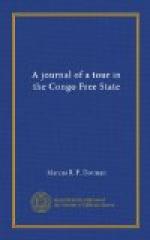On August 1st at sunset we reach Irebu, an exceedingly beautiful place. An avenue of palms stretches parallel to the river and about twenty yards from it the bank itself being fenced by white wooden rails. This leads to a large open square around which are the brick houses of the European officers. Beyond, along the river front, are more brick houses, the Mess and the Magazines, and gardens are laid out the whole length of the town. This is one of the large military training centres, where about a dozen officers prepare more than a thousand recruits for the Force Publique.
In the evening the place was illuminated by very simple, but effective, means. Stakes were driven into the ground and on each was placed a tin which presumably had contained condensed milk. These were filled with palm oil and pieces of wood to serve as wicks. The mosquitoes here are very bad indeed and it is necessary to take quinine every day to counteract the effects of their poison.
At daybreak next morning most of the troops were exercising in the square and their precision and manoeuvring were really marvellous. Any European colonel might indeed be proud to hear such a single click as his regiment shouldered arms. The officers state that the natives attend very carefully all the time for the word of command and act very quickly after it is given. The native corporals evidently make good instructors and the raw recruit is soon converted into a smart and responsible soldier. This military education is certainly the best that could be given to a savage; it teaches him punctuality, regularity, obedience and collective responsibility; it shows him how to build houses and keep them clean and it gives him an idea of justice for he knows he will be punished for wrong doing. The soldier therefore soon becomes an altogether different person and realises that he is no longer an animal-man living wild in the forest, but a soldier-man and a friend of the great Bulamatadi. who governs the country. What we may call the caste feeling has indeed contributed greatly to civilising the country. Anyone who is brought into direct contact with the whites as a soldier, a worker in the plantation or on the roads, soon feels that he is superior to the wild bushman and then becomes more attached to his new master than to his own cousins. It is rather amusing to hear the native domestics or boys. who probably rank higher than any other natives on the social ladder, speaking of the indigenes. with great contempt as though they were quite another and an inferior species. Speaking of Bulamatadi, it may be of interest to state the origin and meaning of the term—it means literally in the native tongue one who breaks stones. and was given to Stanley, when he blasted rocks to make roads the term being afterwards buried with him on his coffin. Since then it has been applied to all officials of the State and is used to connote anything and everything




